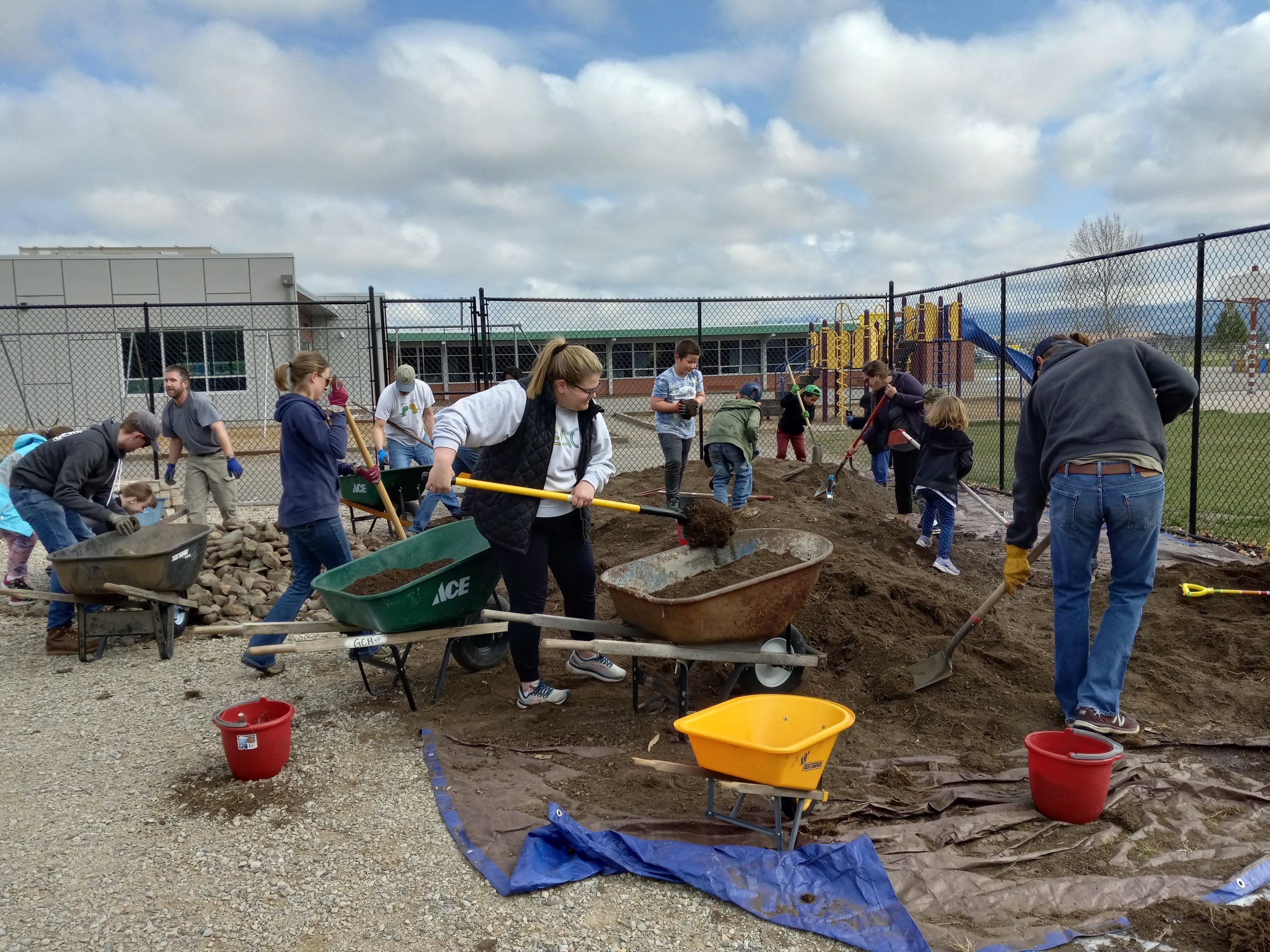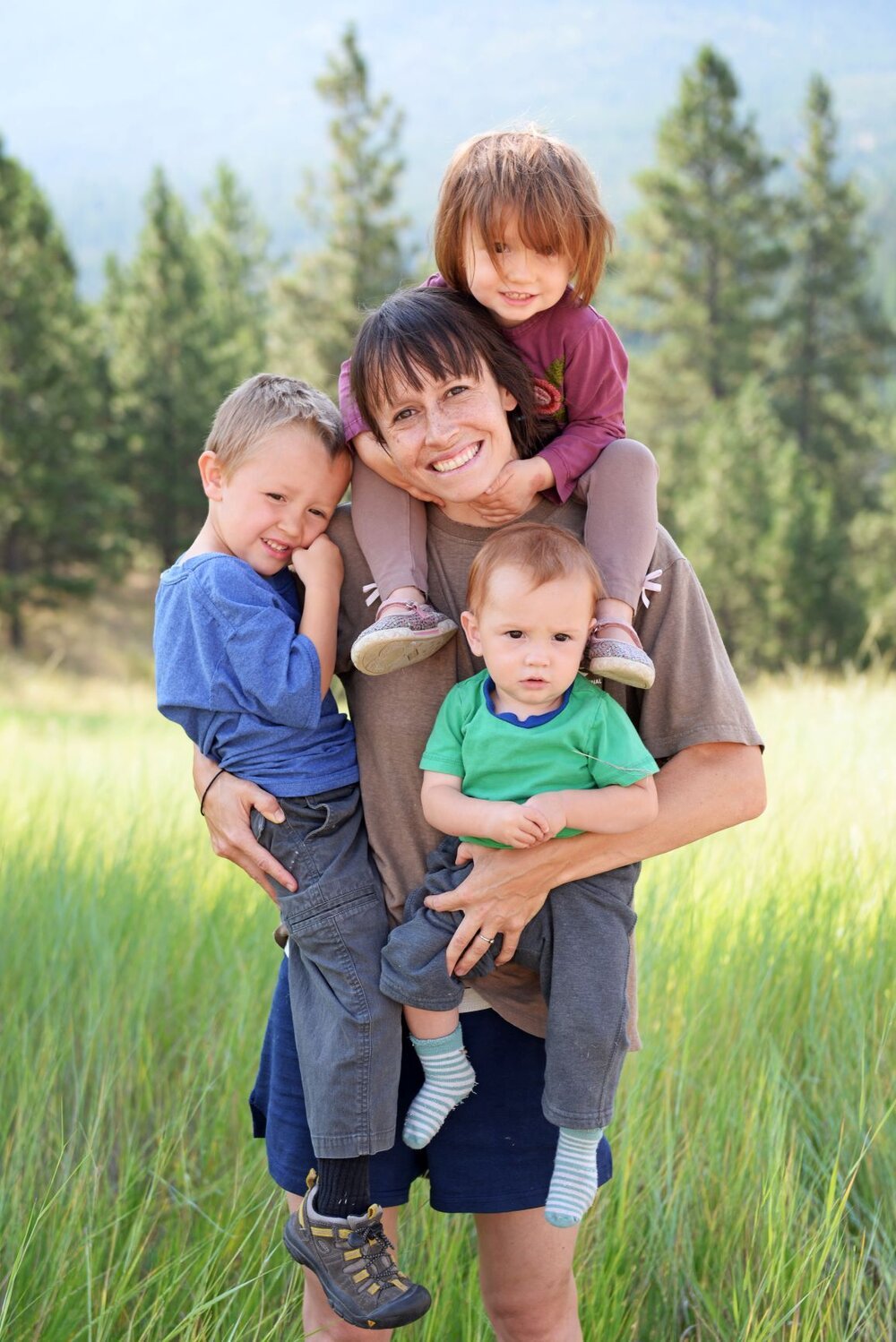Building Nature-Based Communities: An Interview with Megan Thornton
Megan Thornton is a passionate climate advocate and mother from Montana. She played an integral role in establishing the garden at Russell Elementary School, where her kids attend. We asked her about her experience getting this project off the ground, along with what inspires and motivates her.
HOW LONG HAVE YOU BEEN CLIMATE CONCERNED?
I have been concerned about the health of the earth since high school, when my mom introduced me to author and farmer Wendell Berry. Around the time my first son Samuel was born, I read an interview in the Sun Magazine about the climate crisis with Mary Christina Wood, a mother and environmental law professor. She challenged us as guardians of our young people to grapple with the legacy older generations will be leaving behind if we don’t wake up from our complacency in how we are harming the earth and climate. Her words shook me up and I decided to engage more proactively in climate work. I was so grateful to find and join Families For a Livable Climate a couple years later.
WHAT INSPIRED YOU TO HELP START THE RUSSELL SCHOOL GARDEN?
My two older kids go to Russell so it is part of my neighborhood community. Like many in the Garden City, I want to find ways for kids to be connected to nature and to know where food comes from. Love of nature, connection to place, as well as real life science skills are all part of the foundation for addressing the climate crisis for the next generation. Russell school was one of the last schools in Missoula to build a garden. The initial attempt was dropped due to a school remodel a few years ago. So there was strong principal support, excitement and buy-in from staff, and community support in the form of generous donations and work hours.
WHAT CHALLENGES DID YOU FACE?
Small challenges inevitably come up as part of creating and maintaining a community space. A surprising challenge we faced was that some of our donated soil was contaminated with a herbicide. After a number of plants started shriveling, we had an extension agent diagnose the problem and we had to pull out three beds of affected plants. The site where we got the soil from was chemical free, but was likely contaminated when the pesticide sprayed on an adjacent field drifted over its boundaries. Another MCPS school garden had a similar situation in which a nearby herbicide application killed its fruit trees. I hope this can be a learning opportunity for folks who are not aware of the issues with applying chemicals for greener “weed free” lawns. Seeing how it shrivels and kills plants makes me worry about the effects it might be having on pollinators, pets and humans. I am really grateful for the work of Grow Safe Missoula on spreading awareness and finding viable organic alternatives to managing green spaces.
WHAT POSITIVE OUTCOMES HAVE YOU EXPERIENCED BECAUSE OF THIS WORK?
The garden has been a pleasure to work on, and our team is awesome. I am lucky to co-lead with my sister, Katie Halloran! Garden City Harvest (Jason Mandala and Sarah Eiden!) have been provided amazing support from construction to leading summer and school year engagement. With 3 young kids and my own growing edges toward being a healthier person, I regularly stall out with the garden and other projects, but just return to the work when I can. Having a strong team makes all the difference. Even this first year the garden is beautiful and producing food.
IS THERE A LARGER VISION OR INSPIRATIONAL SOLUTION FOR OUR FUTURE THAT YOU’D LIKE THIS WORK TO BE A PART OF?
I believe in moving towards the vision of intergenerational, nature-based communities. We can’t do it as individuals. While technology and best practices are pieces of the puzzle, I believe the most important task is creating healthy cultures and communities. Little Red Hen may have been able to do it all: imagine the warm delicious loaf of bread, grow the wheat, harvest and grind the wheat, bake the bread, and eat it all! She probably got a tummy ache! In reality, we all need to contribute to both the hard work and the celebration. I imagine less driving and flying, more walking, biking, river dipping, communal spaces for growing food, raising animals on a small scale with reverence and gratitude, creating new or reviving old rituals and festivals and learning the practical arts. In doing this we necessarily become deeply connected to our neighbors. Community gardens, including school gardens, are great steps towards this vision!
TELL US ABOUT ANY RECENT ACCOMPLISHMENTS OR INSPIRATION THAT YOU’D LIKE TO SHARE.
Russell school along with other MCPS schools implemented a zero waste program last school year and I was able to play a small role on the planning team that made this happen. It's been inspiring to see students make connections between a garden and zero waste. Kids say things like: Composting just makes sense! So my banana is becoming dirt? Paper towels come from trees so they can be composted! Seeing how our trash can be turned into rich compost to grow food and other plants is very cool. We got a donation of compost from Garden City compost for our garden, which is where our school compost gets processed into a soil amendment, so it’s fun to see the full circle. Eventually we would like to do more on-site composting. It’s just as important to understand the death, decay, regeneration piece as it is the growth, flowering and fruiting - as a full cycle.
DO YOU HAVE WORDS OF ENCOURAGEMENT OR WISDOM FOR PARENTS OR CAREGIVERS WHO WANT TO GET INVOLVED WITH CLIMATE ACTION BUT DON’T KNOW WHERE TO START?
Over time I have moved towards centering self-compassion, discovering my own gifts and finding joy as the best tools I have for being part of positive change. I have hope that humans have what it takes to turn the tide; that we are evolving to become wise and empathetic stewards of life. Grief and rage are normal and important to feel, we need to feel in our bodies and hearts what has been lost and what is at stake, be it loss of loved ones, loss of species, loss of ecosystems, loss of lifeways, in order to care. We need to be truthful and transparent about how the powers that be (and we ourselves) are causing harm, and push our leaders towards better choices. And it’s complex, as many of us don’t get the support we need to emerge from constant overwhelm, poor health, and lack of support in healing our traumas. Being deeply self-compassionate - recognizing our own beauty and goodness, how we belong as much as a songbird or a river or a stone- is perhaps a good place to start. I call my kids and partner sweetheart, and I call myself sweetheart too!
—
Megan Thornton lives in the Russell neighborhood with her husband Orion and their three children, Samuel (7), Willa (5) and Ben (3), alongside human, plant and animal neighbors (squirrels, maples, deer, rolly-pollies, sunflowers, pigeons!!....). Megan feels inspired and uplifted to be part of Families For a Livable Climate, finding much needed support and connection in navigating the climate crisis and all its terrains (truth, grief, despair, anger, resilience, action). Megan hopes to someday have a herd of goats, but for now, Patches the backyard bunny will have to do.

